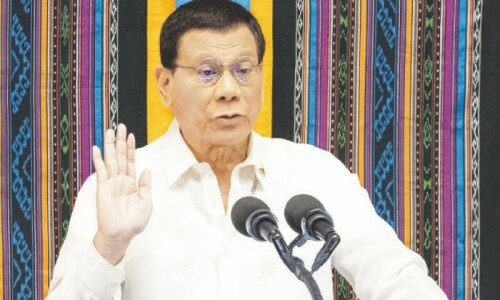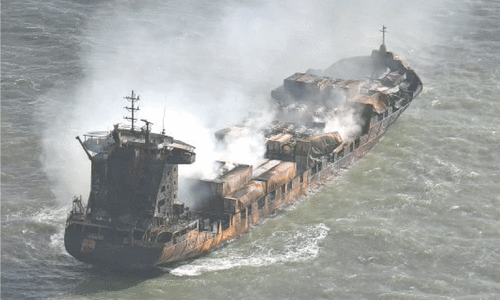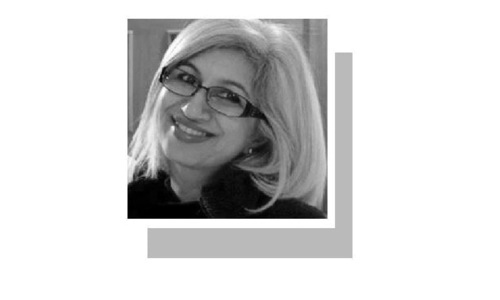• Experts say without finance climate action will be ‘just talk’
• PM Shehbaz expected at the event today
• Report seeks ban on fossil fuel ads
As delegates from across the world gathered in Baku to “agree a new global climate finance goal” on the first day of the annual climate conference, experts and climate activists said the Global North (developed world, mostly) has a “legal and moral obligation” to compensate the developing states for the damage it has caused to the climate over the decades.
On Monday, as COP29 commenced in Azerbaijan’s capital, UN Climate Change Executive Secretary Simon Stiell agreed it is a tough task to evolve consensus. In his opening remarks, he said: “In tough times, up against difficult tasks, I don’t go in for hopes and dreams. What inspires me is human ingenuity and determination. Our ability to get knocked down and to get up again over and over again until we accomplish our goals.”
However, the opening plenary got delayed for hours due to protracted consultations to hammer out ‘disputed items’ which could potentially lead to an “agenda fight”. It finally started a little before 8pm (Baku time), several hours after its scheduled time.
The agenda was finally adopted following extensive consultations, but the plenary was still going on by the time this report went to press.
‘Global South vs Global North’
Speakers at an event organised by ActionAid, however, said that without finance, the talk about climate action will merely remain talk.
Global Climate Justice Lead at ActionAid Teresa Anderson said the Global South was already paying the climate cost and the whole point of the NCQG (New Collective Quantified Goal) was to finally get the Global North to contribute properly for the damage it caused.
“COP 29 is a test of wealthy countries’ commitment to securing a liveable planet. If we want to unleash climate action on a scale that can save our future, the countries that have caused the climate crisis must pay to fix the mess,” she argued.
Ms Anderson said loans disbursed in the shape of climate finance worsened the crisis, forcing the developing state prioritise debt payments over the climate crisis.
She called out the wealthy nations for turning this crisis “into an investment framework”.
Mosammat Dulali, a community member from Bangladesh, said this year alone there were four cyclones, adding that people were living in a state of constant fear, never knowing what disaster will the future bring.
“We cannot face this crisis alone,” she said, adding that they won’t be able to sustain in the long run without help from the wealthy nations.
ActionAid Executive Director Michelle Higelin stressed the need for developed countries to commit $1 trillion as a climate finance goal, and there were a range of approaches to mobilise this urgently needed finance, including ending indirect and direct fossil fuel subsidies, which “amount to over $7 trillion annually, including what’s needed to clean up after climate disasters”.
She termed loans for climate counter-productive, pushing the climate-hit countries further into debt distress. “The $1 trillion goal must cover climate change adaptation, mitigation and loss and damage,” she said while talking about NCQG.
In reply to a question about Donald Trump’s election as the US president, she said it seemed likely that the US would not now pay its fair share of climate finance under the incoming government, “but this is a test for rich countries”.
“Will they follow Trump’s lead and just give up on the climate by default?” she questioned.
Speaking to Dawn on WhatsApp, Islamabad-based climate expert Imran Khalid agreed that non-concessionary grants and loans had further burdened the vulnerable countries and due to tepid response to the previous finance goal of $100 billion, the new finance goal of NCQG will be difficult to negotiate.
“…the issue in Baku is in regard to the broader goal of climate financing from developed to developing world. Rich countries have not been following up on their promises,” Mr Khalid said.
Speaking about the funds received by Pakistan after the 2022 floods, he said these funds were not “new financing”
Climate disinformation
On the sidelines, the Climate Action Against Disinformation (CAAD) coalition launched its annual report, underscoring the connection between the big tech and fossil fuel companies and demanding a ban on fossil fuel advertisements.
“For the third year running, CAAD has documented millions of dollars of fossil fuel advertising around COP,” said CAAD Intelligence Unit Coordinator Sean Buchan in a statement.
“While the world meets to try to keep the Paris Agreement promise, the fossil fuel industry pollutes the information ecosystem to cloud our minds. A fossil fuel ad ban is imperative to protect public health and accelerate climate action.”
Speaking at a session organised by the Earth Journalism Network a day before COP29, Devin Bahceci, Information Integrity and Anti-Disinformation Manager at Global Strategic Communications Council revealed that eight fossil fuel companies spent $17.6 million on Meta ads, reaching almost 700m impressions.
Meanwhile, Pakistan is all set to hold over 40 events at its pavilion in the UN-run Blue Zone, according to the COP agenda shared by an official with Dawn.
Prime Minister Shehbaz Sharif is also expected to arrive today (Tuesday) to attend the World Leaders Climate Action Summit, where he is expected to make a pitch for climate diplomacy to put a joint front against climate-induced disasters. He will address the summit on Wednesday and attend several high-level events on the sidelines of the summit.
This story has been produced as part of the 2024 Climate Change Media Partnership, a journalism fellowship organised by Internews’ Earth Journalism Network and the Stanley Centre for Peace and Security.
Published in Dawn, November 12th, 2024















































